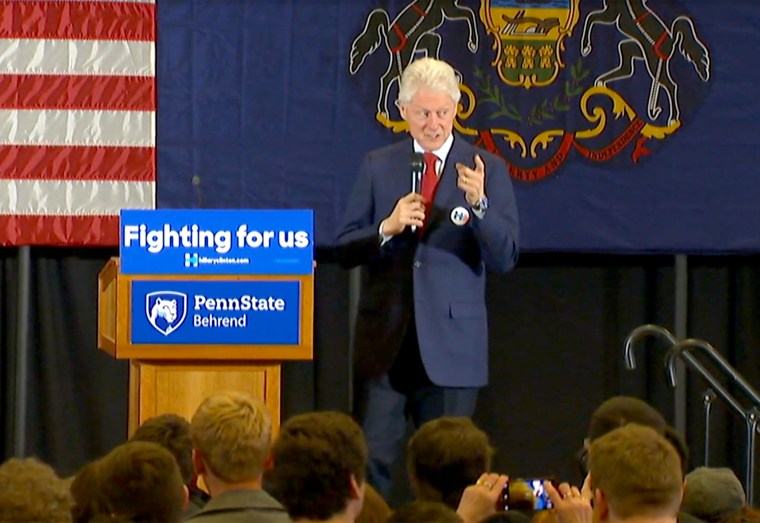Former President Bill Clinton was heckled by Black Lives Matter activists in Philadelphia on Thursday night during a stump speech for his wife, Hillary Clinton.
However, this morning in Erie, Pennsylvania, his tune changed and he appeared to regret his comments, saying, "I rather vigorously defended my wife, as I am one to do, and I realized, finally, I was talking past her the way she was talking past me. We gotta stop that in this country. We gotta listen to each other again.”
Clinton addressed a crowd of 1,200 people at a gymnasium at Penn State Behrend.
“I know those young people yesterday were just trying to get good television and they did. But that doesn’t mean that I was most effective in answering it,” he continued. “So I will say again, when I signed that crime bill, I was worried about the excess sentences but the Republicans demanded it and we couldn’t pass it without it."
RELATED: Analysis: Black Leaders Supported Clinton's Crime Bill
At Thursday night’s speech, activists displayed signs in the crowd that read, “Clinton Crime Bill destroyed our communities,” and "Clinton $16 billion for prison grants and police expansion" and “Black youth are not super predators."
The former President responded with a sharp ten-minute response that included a defense of his 1994 crime legislation. In the two decades after the bill passed incarceration in the U.S. spiked 300 percent.
The U.S. is now the world's number one incarcerator with over 2.2 million behind bars. The bill widely known as "the Clinton Crime Bill" is formally titled the Violent Crime Control and Law Enforcement Act of 1994. It legislation is widely credited as policy that expanded incarceration in the U.S. to record levels.
"We had 13-year-old kids planning their own funerals. She [the protester] doesn't want to hear any of that. You know what else she doesn't want to hear? Because of that bill we had a 25 year low in crime, a 33 year low in the murder rate, and - listen to this - because of that and the background check law a 40 year low in the deaths of people from gun violence and who do you think those lives were?" Clinton shot back at protesters.
"I don't know how you would characterize gang leaders who got 13-year-old kids hopped up on crack and sent them out on to the street to murder other African Americans children. Maybe you thought they were good citizens she didn't. You are defending the people who killed the lives you say matter. Tell the truth," Clinton said defending the use of the term "super predators" by his wife, then-first lady Hillary Clinton during a speech in 1996.
Clinton apologized for the phrase "super predator" in February after a Black Lives Matter protester confronted her with a sign saying "we have to bring them to heel" at a South Carolina fundraiser on February 24. "Looking back I shouldn’t have used those words,” she told the Washington Post.
The fact that her husband is defending those words is a distraction the campaign doesn't need heading into the New York and Pennsylvania Primaries on April 19 and April 26.
Reaction on online was swift.
"The "Big Dawg" just peed on the carpet with this one. Bill Clinton defending "super predator" language is WRONG!" wrote former Obama Administration official Van Jones. Jones has been involved in pushing criminal justice reform legislation in Congress through his organization Cut50.
"Bill Clinton dismissed both the impact of the crime bill and doubled down on defending language that even Hillary has distanced herself from," wrote DeRay Mckesson on twitter, a Black Lives Matter activist who launched Campaign Zero last year.
"Bill Clinton really stepped in it. And not the first time. But there's a LOT of historical amnesia about the origins of the '94 crime bill," wrote Josh Marshall, the Publisher of TPM.
"Black Lives Matter probably wouldn't have even arisen if not for brutal policies Clinton put into place, now he's hearing back about them. It's really poetic justice Bill Clinton is getting roasted by the descendants of the people victimized by his mass incarceration policies," said journalist Murtaza Hussain, a writer for the Intercept, in a series of tweets.
Fordham Law School Prof. John Pfaff also offered pushback on the notion the Clinton Crime Bill lowered incarceration. In a series of twitter posts, he made several points.
"Reduced crime? No. Just no. No. No. To start, crime drop started in 1991, not 1994. No change in trend in 1994," wrote Pfaff. He also made the point that crime policy and incarceration are more impacted by state law rather than federal.
"Ending #MassIncarceration is a state-by-state, county-by-county battle. Fighting crime is too. That’s where attention must be focused," he added.
